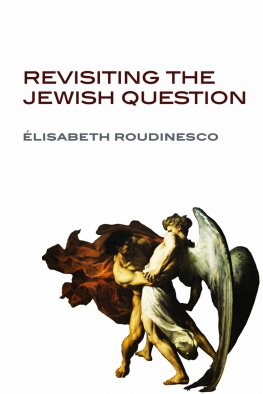Socialism of Fools
Socialism of Fools
Capitalism and Modern Anti-Semitism
Michele Battini
Translated by Noor Mazhar and Isabella Vergnano
Columbia University Press
New York

Columbia University Press
Publishers Since 1893
New York Chichester, West Sussex
cup.columbia.edu
Originally published as Il socialismo degli imbecilli. Propaganda, falsificazione, persecuzione degli ebrei by Michele Battini. 2010 Bollati Boringhieri editore, Torino.
Copyright 2016 Columbia University Press
All rights reserved
Library of Congress Cataloging-in-Publication Data
Battini, M. (Michele), author.
[Socialismo degli imbecilli. English]
Socialism of fools : capitalism and modern anti-Semitism / Michele Battini ; translated by Noor Mazhar and Isabella Vergnano.
pages cm
Includes bibliographical references and index.
ISBN 978-0-231-17038-3 (cloth : alk. paper)ISBN 978-0-231-54132-9 (e-book : alk. paper)
1. AntisemitismEuropeHistory19th century. 2. AntisemitismEuropeHistory20th century. 3. JudaismRelationsChristianity. 4. Christianity and other religionsJudaism. 5. Christianity and antisemitismHistory19th century. 6. Christianity and antisemitismHistory20th century. 7. CapitalismEuropeHistory19th century. 8. CapitalismEuropeHistory20th century. 9. JewsPersecutionsHistory19th century. 10. JewsPersecutionsHistory20th century. I. Title.
DS146.E85B3813 2015
305.892'404dc23
A Columbia University Press E-book.
CUP would be pleased to hear about your reading experience with this e-book at cup-ebook@columbia.edu.
Cover Design: Martin Hinze
References to websites (URLs) were accurate at the time of writing. Neither the author nor Columbia University Press is responsible for URLs that may have expired or changed since the manuscript was prepared.
Contents
A first and revised version of takes up some ideas discussed at the conference Storia, verit, diritto (History, truth, the law) organized by the Societ Italiana per lo Studio della Storia Contemporanea (Italian society for the study of contemporary history) and by the Giunta Centrale per gli Studi Storici (Central committee for historical studies) of the Universit di RomaLa Sapienza, in April 2008. The manuscript is finally the result of a dialogue with Carlo Ginzburg, which took place on the occasion of the seminar held by the Department of History of the Universit di Pisa, in April 2008, Il paradigma indiziario (quasi) trentanni dopo (The circumstantial paradigm [almost] thirty years later).
I record my sincere thanks to Carlo Ginzburg, Ira Katznelson, Nadia Urbinati, Stathis Gourgouris, Andrew Arato, Federico Finchelstein, Neni Panourgia, Andreas Kalyvas, Marie-Anne Matard, Gilles Pcout, Fabio Levi, Stefano Levi Della Torre, David Bidussa, and Guri Schwarz; the conversations I had with them on specific topics at different stages of the composition of the book were illuminating and precious.
This book focuses on a break that constituted a change of fundamental importance in the history of European cultures: the morphological transformation of the millenarian anti-Jewish Christian tradition, shaped between the fourth and fifth centuries, into a new anti-Semitism that grew from hostility to the legal emancipation of the Jews in the late eighteenth century. Emancipation was won in 1791 for the first time, following the Declaration of the Rights of Man and the Citizen in revolutionary France. After a few years, the anti-Semitic propaganda opposed emancipation by launching a frontal attack against the rights of citizenship and those who were considered responsible for it: the thinkers of the Enlightenment, above all, the writers of the German Aufklrung and the Jewish German Haskalah, together with their interlocutors, the philosophes and chrtiens clairs, on the other side of the Rhine. The constitutional state and political emancipation eliminated the discrimination that for centuries had guaranteed the segregation of the Jewish communities from Christian societies of Europe. It also removed the control over the banking, commercial, and financial activities of the Jews that the monarchies had exploited to sustain their courts. So with the advent of the market society, the old stereotype of Jewish usury was transformed into an attack on what economists and sociologists later called capitalism. The anti-Semites identified the capitalists with the Jewish financiers and therefore made the latter the scapegoats for the crises of the modern industrial economy, caused, according to them, by financial speculation, that is, usury.
My hypothesis is that this anti-Semitic anticapitalist literature arose in the context of the intransigent Catholic reaction against the revolution in political rights, the free market, and secularization. For instance, in 1806 Viscount Louis de Bonald began the propaganda campaign against the Jews of the French Empire and the Kingdom of Italy, which soon led to grave limitations on the legal equality and citizenship rights of the Jews. This was the new paradigm that arose in those years: the old enemies of Christianity had become equal to all other citizens and in fact constituted a hostile power within the national Christian community; thanks to the democratic guarantees they had obtained, the Jews could now with impunity conspire to use their economic power to conquer political power. As a consequence, the fight against Jewish capitalism should have been directed against its main protectors, namely, liberal institutions and the constitutional state.
This paradigm spread in the early decades of the ninetheenth century via intransigent Catholic texts and among the antiliberal social economists and the authors of the churchs social doctrine; then a Fourierist writer, Alphonse Toussenel, appropriated it around 1845. With the work of Pierre-Joseph Proudhon, the paradigm circulated widely among the socialist associations of skilled and unskilled craftsmen and workers. Proudhon, an economist, was fully aware of the Christian social doctrines hostility to free market. In the last decades of the century, this paradigm reappeared anew in the texts of the Catholic and nationalist writer douard Drumont, in the proclamations of the Christian Social propagandists of the Habsburg Empire, and in the literature of the anti-Semitic German leagues and of some socialists of Lombardy and Veneto, Italy. The Protocols of the Elders of Zion was a late expression of this history. In the syndicalist and nationalist texts, and in particular in those of the Italian Paolo Orano (and also those of Maurice Barrs), the new anti-Semitic paradigm reappeared in its final version, the one that fueled the press campaign preceding the anti-Jewish legislation in Central Europe and Italy between 1933 and 1938.
The foregoing is a summary of this book. In studying the relevant texts and documents, the main difficulty was maintaining a detached stance in order to avoid errors of anachronism, such as interpreting the words of the authors and protagonists according to their meaning today. The risk of anachronism is highest in the case of the word usury, which played a decisive role in the representation of the Jews as enemies of society. This interpretative precaution led me to single out the texts, documents, and sources that contributed to the definition of the comprehensive ideology as anti-Jewish and anticapitalist (and structures and analogous arguments that mark the anti-Jewish, anticapitalist paradigm. In other words, the same structures are present in documents from different ideological fields and political families.
But using general concepts (for example, social racism or left-wing anti-Semitism) in order to classify the sources and define the rhetorical structures would not by itself lead to rigorous conclusions. Adorno and Horkheimer argued that while there was no longer any need for economic domination, the Jews had been marked out as the absolute object of domination pure and simple; for this reason, according to them, no economic or social interpretation of the hatred toward the Jews would be possible. Anti-Semitism is an attitude of hatred toward the process of assimilation and the mimetic behavior of the Jews and therefore a manifestation of the deep roots of that hatred in our civilization, which still remain obscure.
Next page







